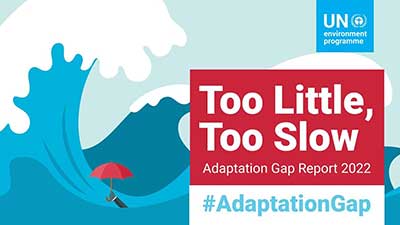Date: 07/11/2022
Relevance: GS-3: Climate Change and International Conventions.
Key Phrases: Climate Change, Climate Adaptation, COP(Conference of Parties), UNFCCC, Developed Countries, Mitigation Efforts, Global Warming, Climate Adaptation Cost, Credibility, UNEP, Climate Challenge, GHGs Footprint, Carbon Neutrality, Net Zero Emission.
Context:
- Recently, UNEP released Adaptation Gap Report 2022 and commented that adaptation efforts are not consistent with climate risks.
Key Highlights:
- This report, along with the Emissions Gap Report, released by UNEP last week, provides a grist for the climate negotiations that will get underway at the COP27 meeting set to happen in Sharm el Sheikh, Egypt between November 6 and 18.
- Almost three-quarters of nations have some adaptation plans in place, but financing and implementation fall far short of what is needed.
- The UNEP report also underlined that the challenge ahead is not only in intensifying funding but also in channeling the money to projects that achieve the desired outcomes.
Adaptation Gap Report 2022
- The UNEP Adaptation Gap Report (AGR) series provides an annual science-based assessment of the global progress on adaptation planning, financing, and implementation.
- UNEP has published the AGR since 2014, with the aim to inform the climate negotiations among UN Member States.
- It also explores options for enhancing and advancing national and global adaptation efforts and provides in-depth analysis of selected issues of interest.
- The 2022 report found that the costs of adaptation are likely at the higher end of an estimated $140-300 billion per year by 2030 and $280-500 billion per year by 2050 for developing countries only.
- Even if the world limits warming to 1.5°C, many climate risks remain and will be irreversible, a latest UNEP report released said that the gap between costs of adaptation and the current financial flow is widening.
27th Conference of Parties (COP27)
- The 2022 United Nations Climate Change Conference, also known as COP27, is the 27th United Nations Climate Change conference.
- It is scheduled to be held in the city of Sharm el-Sheikh, Egypt from November 6 to November 18, 2022.
- COP27 will bring governments together to accelerate global efforts to confront the climate crisis.
- It is an important meeting because the latest science shows that climate change is moving much faster than we are, pushing ecosystems and communities to their limits.
- The Conference of Parties comes under the United Nations Climate Change Framework Convention (UNFCCC) which was formed in 1994.
- The UNFCCC was established to work towards “stabilisation of greenhouse gas concentrations in the atmosphere.”
Issues of Climate Adaptation:
- Inadequate Funding:
- One of the key messages in the Adaptation Gap Report is the woefully
inadequate flow of finance into adaptation efforts.
- Adaptation finance needs could be around US$202 billion a year, it says; in contrast, international adaptation finance flows to developing countries amounted to $29 billion in 2020 US$612 billion/year) this decade.
- One of the key messages in the Adaptation Gap Report is the woefully
inadequate flow of finance into adaptation efforts.
- A third of the 197 parties to the United Nations Framework Convention on Climate Change (UNFCCC) have incorporated quantified and time-bound targets on adaptation and 90% of them have considered gender and disadvantaged groups.
UNEP
- It was established by Maurice Strong after the United Nations Conference on the Human Environment in Stockholm in June 1972 and headquartered in Nairobi, Kenya.
- It is responsible for coordinating responses to environmental issues within the United Nations system.
- UNEP hosts the secretariats of several multilateral environmental agreements and research bodies, including The Convention on Biological Diversity (CBD), The Minamata Convention on Mercury, The Convention on Migratory Species and The Convention on International Trade in Endangered Species of Wild Fauna and Flora (CITES).
- In 1988, the World Meteorological Organization and UNEP established the Intergovernmental Panel on Climate Change (IPCC).
Way Forward:
- For developing countries to enhance their ambition, developed countries must provide enhanced support.
- Need of nature-based solutions to link actions on mitigation and adaptation in terms of planning, financing and implementation, which would provide co-benefits.
- It is required urgent efforts to increase the financing and implementation of actions designed to adapt to the growing impacts of climate change,
- Developed countries must honor their long-standing obligations under the UNFCCC and the Paris Agreement, including the provision of climate finance, technology transfer, and capacity building to the developing countries.
- There should be collective effort around making adaptation projects investible.
Conclusion:
- Recognizing the current challenges faced by developing countries requires intensified multilateral cooperation, not intensified global economic and geopolitical competition and trade wars.
Source: The Hindu BL
Mains Question:
Q. What are the issues of climate adaptation efforts? Suggest the measures to solve these issues. (150 Words).






















